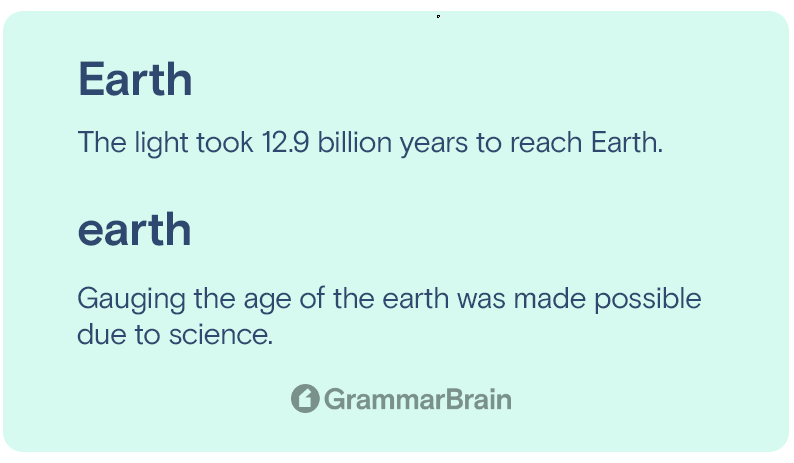When is Earth capitalized? Capitalization (verb), in its simplest form, represents using capital letters to start a work, phrase, or sentence. Capitalization is generally used in the case of proper nouns (name, person, place, or thing), but in special cases, it can be used in the case of common nouns as well.
For example, Earth is a proper noun but is always treated as a common one.
Understanding when to capitalize the word “Earth” — general capitalization rules
Per the rule of English grammar, it should always begin with a capital letter, irrespective of its placement within:
(1) the sentence,
(2) a phrase in a blog,
(3) an article,
(4) news,
(5) story,
(6) poem-verse,
(7) newspaper verse,
(8) magazine column, or any other source.
Sun, moon, and earth are always used in lowercase.
According to a preconceived notion, the earth revolves around the sun, and the moon revolves around the earth.
The astronauts landed on the moon. The moon is the natural satellite of the earth. The space shuttle orbiting around the Earth will return next year.

Should “Earth” be capitalized?
Our solar system consists of nine planets – Mercury, Venus, Earth, Mars, Jupiter, Uranus, Saturn, Neptune, and Pluto.
We saw that the capitalization of “Earth” as a planet depends on the context and is not a rule. It is simply a practice and can be treated as a proper and common noun in practice.
When should you capitalize earth?
We saw that the earth can be a proper noun or a capital noun depending upon the usage within a sentence. Either way, it carries the same meaning. There are instances when we refer to the planet, and not the soil on which we live.
So, in the former case, it should be the “Earth” (planet), and in the latter case, it should be the “soil” (ground) on which we live. In the case of planet earth, we prefix it with the article “the”. This makes it the planet Earth.
Examples for understanding when to capitalize the word Earth
English Grammar always teaches us that we must capitalize the proper nouns but leave the common nouns in lowercase.
Taking the example of the earth as a celestial body, it should be capitalized. For example: When we say Mercury, Venus, Earth and so on, we see that it is capitalized.
Another way around, when we use Earth in science fiction, it should be capitalized.
Third, the earth should be used in lowercase if referring to the ground beneath.
In a fourth instance, the earth should be used in lowercase when writing the words like the salt of the earth, hell on earth, and down to earth.
Examples of sentences with capitalized Earth
- The light took 12.9 billion years to reach Earth.
- European scientists have recorded the loudest animal on Earth.
Examples of sentences with lowercase earth
- Greenhouse gas emissions affect the earth’s climate drastically.
- Gauging the age of the earth was made possible due to science.
Lowercase earth is generally used when we refer to the earth’s soil, land, or salt.
As an example, the rocky earth felt cold on my feet. Here it would be inappropriate to make use of capital “e” in Earth.
Trick to remember the correct use
The dirt or the soil is a small part of the planet. Therefore, it will be in lowercase and the planet will be in uppercase.
Inside this article
Fact checked:
Content is rigorously reviewed by a team of qualified and experienced fact checkers. Fact checkers review articles for factual accuracy, relevance, and timeliness. Learn more.
Core lessons
Glossary
- Abstract Noun
- Accusative Case
- Anecdote
- Antonym
- Active Sentence
- Adverb
- Adjective
- Allegory
- Alliteration
- Adjective Clause
- Adjective Phrase
- Ampersand
- Anastrophe
- Adverbial Clause
- Appositive Phrase
- Clause
- Compound Adjective
- Complex Sentence
- Compound Words
- Compound Predicate
- Common Noun
- Comparative Adjective
- Comparative and Superlative
- Compound Noun
- Compound Subject
- Compound Sentence
- Copular Verb
- Collective Noun
- Colloquialism
- Conciseness
- Consonance
- Conditional
- Concrete Noun
- Conjunction
- Conjugation
- Conditional Sentence
- Comma Splice
- Correlative Conjunction
- Coordinating Conjunction
- Coordinate Adjective
- Cumulative Adjective
- Dative Case
- Determiner
- Declarative Sentence
- Declarative Statement
- Direct Object Pronoun
- Direct Object
- Diction
- Diphthong
- Dangling Modifier
- Demonstrative Pronoun
- Demonstrative Adjective
- Direct Characterization
- Definite Article
- Doublespeak
- False Dilemma Fallacy
- Future Perfect Progressive
- Future Simple
- Future Perfect Continuous
- Future Perfect
- First Conditional
- Irregular Adjective
- Irregular Verb
- Imperative Sentence
- Indefinite Article
- Intransitive Verb
- Introductory Phrase
- Indefinite Pronoun
- Indirect Characterization
- Interrogative Sentence
- Intensive Pronoun
- Inanimate Object
- Indefinite Tense
- Infinitive Phrase
- Interjection
- Intensifier
- Infinitive
- Indicative Mood
- Participle
- Parallelism
- Prepositional Phrase
- Past Simple Tense
- Past Continuous Tense
- Past Perfect Tense
- Past Progressive Tense
- Present Simple Tense
- Present Perfect Tense
- Personal Pronoun
- Personification
- Persuasive Writing
- Parallel Structure
- Phrasal Verb
- Predicate Adjective
- Predicate Nominative
- Phonetic Language
- Plural Noun
- Punctuation
- Punctuation Marks
- Preposition
- Preposition of Place
- Parts of Speech
- Possessive Adjective
- Possessive Determiner
- Possessive Case
- Possessive Noun
- Proper Adjective
- Proper Noun
- Present Participle
- Prefix
- Predicate



